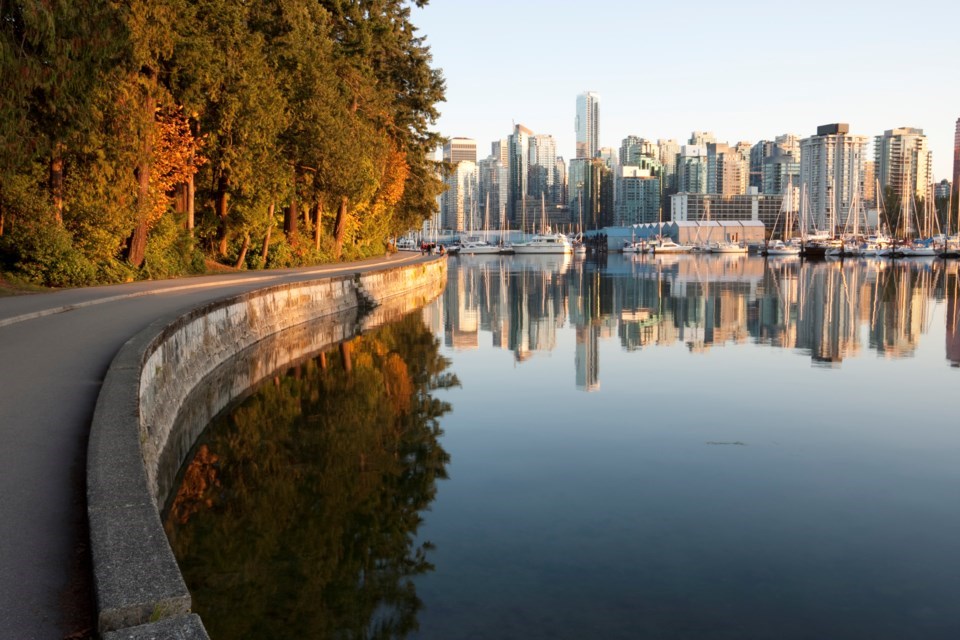For the time being, the Vancouver Board of Parks and Recreation is refusing to release the expert report behind the operation to cut down almost a quarter of the trees in Stanley Park.
At the end of November, the Vancouver Park Board announced scheduled closures of the Lions Gate Bridge, Stanley Park Causeway, and other roads and trails over the next two months while it removes 160,000 trees due to pest infestation and wildfire fears.
The board previously announced periodic closures on Oct. 19 for a two-week period, but did not peg the number of trees marked for removal at that time.
“The primary focus is to prioritize the removal of trees affected by the hemlock looper moth infestation in heavily visited areas of Stanley Park, in alignment with preparations for winter storms, wildfires and bird nesting season,” said Vancouver Park Board spokeswoman Eva Cook.
Cook said B.A. Blackwell & Associates Ltd. is the forestry consultant working with the board, but she refused to say how much the contract is worth. The website for North Vancouver-based consultancy includes a long list of clients, such as the Canadian Forest Service, Parks Canada, B.C. Parks, Ministry of Environment, Metro Vancouver, Resort Municipality of Whistler and Union of B.C. Municipalities.
“Additional information regarding the long-term management of Stanley Park, and associated financial details, will be disclosed in due course,” Cook said.
B.C.’s freedom of information law contains a clause under the heading “public interest paramount” that requires disclosure, without delay, of any information that is about the imminent risk of significant harm to the environment or to the health or safety of the public or a group of people.
It also requires the same disclosure without delay if it is, for any other reason, clearly in the public interest.
While the Vancouver Park Board did announce basic details of the tree removal program and how it affects routes for motorists, cyclists and pedestrians, it has not provided details about the science behind the program.
On Monday, it rejected a reporter’s request to make the expert report available without delay.
“After reviewing the subject matter and seeking advice, I have determined the requested subject matter does not require disclosure in the public interest, under section 25 of [the Freedom of Information and Protection of Privacy Act],” said Cobi Falconer, the city’s director of access to information and privacy.
The executive director of a transparency watchdog organization said the Vancouver Park Board is falling short of its obligations to the public.
“It’s a trust, but … it is a dynamic where there is trust in transparency for public bodies, and they need to be appropriately transparent for people to trust the decision that they are making,” said Jason Woywada of the B.C. Freedom of Information and Privacy Association. “Particularly when you're dealing with a park as prominent as Stanley Park, it's important for the public to be able to understand why 160,000 trees are being cut down in that area.”
In 2016, then Information and Privacy commissioner Elizabeth Denham concluded that the public interest override section of the law may not require disclosure of a record, but sometimes disclosure of a record must happen.
In her analysis of a 2014 drinking water advisory in Spallumcheen, B.C., Denham said it was necessary to require the Ministry of Environment release a soil test data analysis report in order to “assist with public understanding of the science, and to assist with evaluation of the Ministry‘s interpretation of that information and its actions based on that interpretation.”
“This objective could not be accomplished by the disclosure of the mere summary of information contained in those records,” Denham wrote.
Woywada said the province has provided public bodies thorough instructions on how to make decisions under Gender-Based Analysis Plus or the Declaration of the Rights of Indigenous Peoples. But it has not done the same when it comes to deciding when to release information in the public interest.
“That is why, I think fundamentally, we've got so many failings in the access to information system in Canada right now, is it's just defaulting to secrecy and risk management,” Woywada said.



